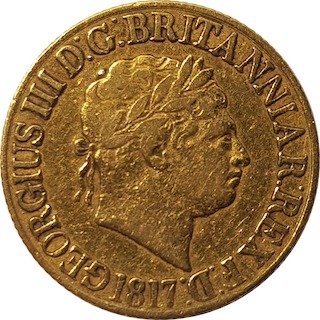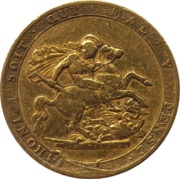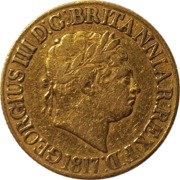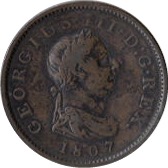
 The 1817 Sovereign - George III
The 1817 Sovereign - George IIIThe 1817 sovereign was the first modern gold sovereign to be issued. The proof is rare.
King George III’s portrait can be seen on the obverse of the coin, Benedetto Pistrucci’s famous portrayal of St George and the dragon is depicted on the reverse.
The sovereign is made of 22 carat gold, and weighs 7.98 grams. It contains 0.2354 ounce of fine gold.
 Only 3,235,239 sovereigns were struck in 1817. It is very unlikely that all of these still exist today, as many have been melted down over the last two centuries.
Only 3,235,239 sovereigns were struck in 1817. It is very unlikely that all of these still exist today, as many have been melted down over the last two centuries.Sovereigns issued from 1817 to 1837 are often described as ‘Early King’ sovereigns. King George III, King George IV and King William IV are all depicted on sovereigns minted during these years.
The value of the 1817 sovereign will be heavily dependent on the date and condition.
Public Domain images, Image Attribution: Classical Numismatic Group, Inc. https://www.cngcoins.com.
Mintage: 3,235,239 (may include coins in sets)
Minted at The Royal Mint
SCBC: 3785
Below are some coins currently being offered on eBay. As an eBay Partner, We may be compensated if you make a purchase.
 Born on 4 June 1738 to Frederick, Prince of Wales and Augusta of Saxe-Gotha in the house of Hanover, George III reigned for over 59 years.
Born on 4 June 1738 to Frederick, Prince of Wales and Augusta of Saxe-Gotha in the house of Hanover, George III reigned for over 59 years.George had 15 children - nine sons and six daughters. In the latter part of his life George suffered from a mental illness and his son George became Prince Regent from 1811-1820 and ruled on his behalf. On George III's death, the Prince Regent became George IV.
Note the latin spelling of George on his coins: Georgivs.
Besides being minted in Britain, Sovereigns have been made in Australia (Melbourne, Sydney, Perth), India (then Bombay, now Mumbai), Canada (Ottawa) and South Africa (Pretoria) although these regional mints have not made sovereigns since 1932 (although India has produced some recently in a private mint partnership with the Royal Mint). The non-British coins carry a small mintmark ('S','M','P','I','C' or 'SA') just above the date. This 1817 Gold Sovereign was minted at The Royal Mint.
The Obverse is the Monarch's head (George III) and the Reverse is most often St George and the Dragon, although other backs have been used and are of interest to collectors. The Reverse often gives the Sovs a new term, like "ShieldBacks".
Specifications for the Gold Sovereign
- Weight: 7.9881g
- Diameter: 22.05 mm
- Thickness: 1.52 mm
- Purity: 22 carat = 91.67% (11/12ths gold, 1/12th copper. Adding copper makes the coin more scratch and dent resistant)
- Gold Content: 113 grains = 7.3224 g = 0.2354 troy ounce
- Face value: £1 = 20 shillings
- Monarch: George III
History
Up until 1604 there was a coin called the English gold sovereign and in 1816 when there was the "Great Recoinage" the name was revived. At that time standard gold (22 carat) was valued at £46 14s 6d per troy pound; this meant a £1 coin needed to weigh 123.2744783 grains or 7.988030269 g. The weight is still the same today.
As a historical note: to maintain the Gold Standard, in 1816 the value of silver was set at 66 shillings for one troy pound and silver coins were only legal for denominations up to £2.
The first sovereigns carried the head of King George III and the famous George and the Dragon design by Benedetto Pistrucci (29 May 1783 – 16 September 1855), an Italian engraver who became chief medallist at the Royal Mint.
With high value coins such as the 1817 Gold Sovereign, collectors and bullion investors often worry about forgeries but actually gold coins are very difficult to forge due to gold's unique properties of density and colour. Gold is extremely dense and to use another metal and gold-plate it would result in a coin that is under-weight, over-diameter or half as thick, something that would be spotted very easily. More difficult to spot would be a bullion coin melted down and re-cast as a highly collectable date, but an expert can usually tell these too. You should always use reputable dealers.
Formed in the reign of Alfred the Great about the year 886, during the period 1279-1812 it was generally referred to as The Tower Mint as it was housed at the Tower of London. The Master of The Royal Mint has included famous figures such as Sir Isaac Newton.
Since 2010 it has operated as Royal Mint Ltd, a company owned by HM Treasury, under an exclusive contract to supply all coinage for the UK although it also produces medals and coins for other countries. It is currently located at Llantrisant, Wales.
The orignal coinage was Pounds, Shillings and Pence but since decimalisation on 15 February 1971, it is £1 = 100p, that is One Pound = 100 pence. The coinage of the UK is also a long history, the Royal Mint being established as long ago as 886AD when coins were hammered. Today there is perhaps 30 billion coins in circulation, and many (numismatic) collectors coins and sets are issued frequently in gold, silver and other metals.








